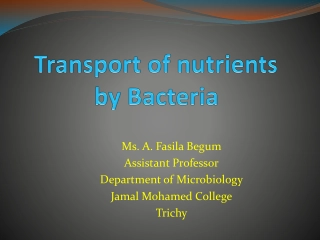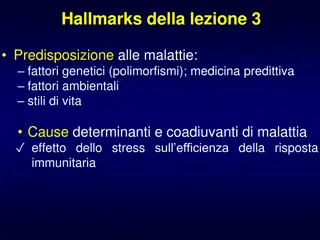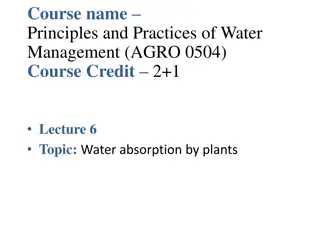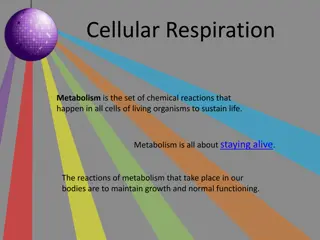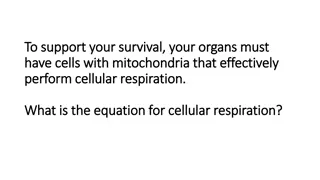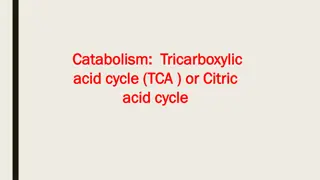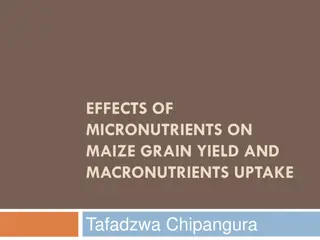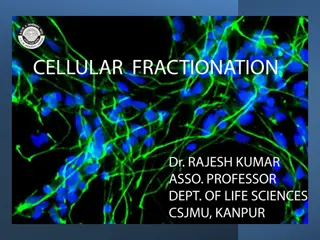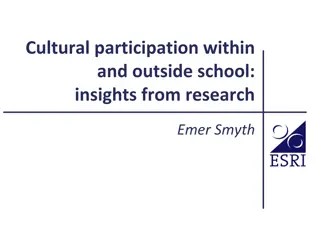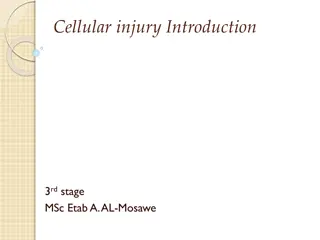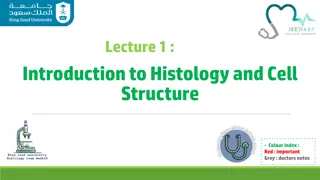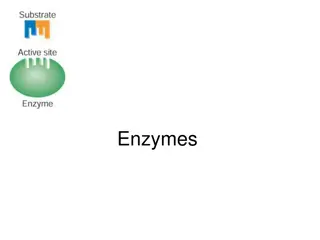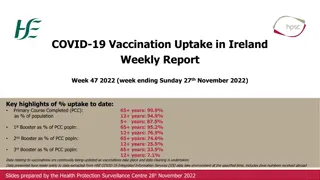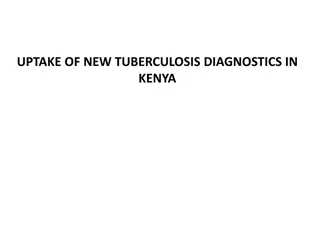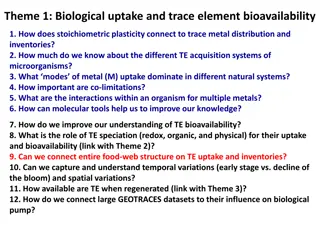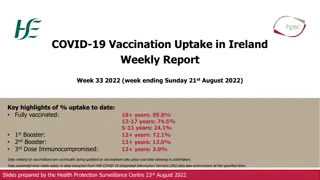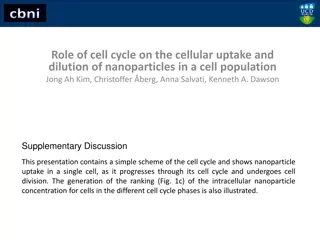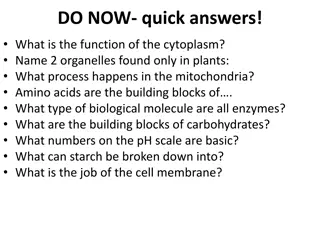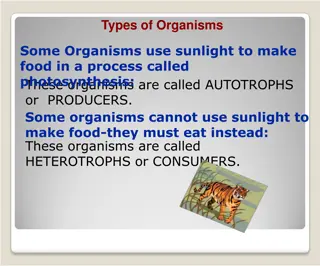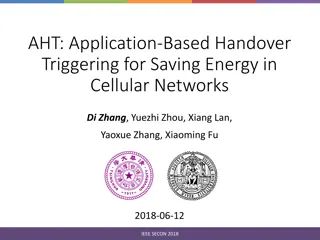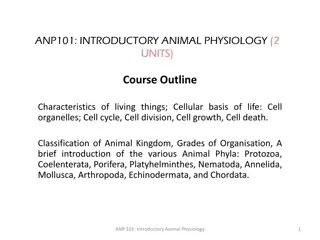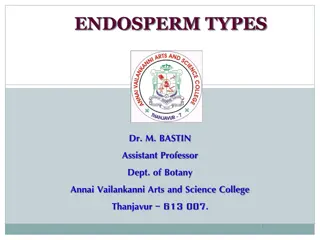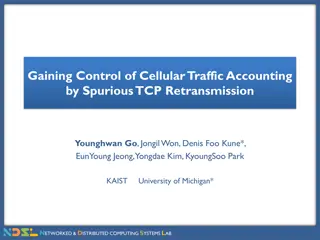Nutrient Uptake in Bacteria: Mechanisms and Factors
The process of nutrient uptake in bacteria, including the role of macronutrients, micronutrients, and environmental factors. Learn about the different mechanisms of nutrient transport and the importance of selective permeability in plasma membranes.
0 views • 25 slides
Understanding Cellular Pathology: Response to Stress and Disease Predisposition
Explore the hallmarks of cellular pathology, including factors influencing disease predisposition such as genetics, environmental factors, and lifestyle. Delve into the cellular response to stress, adaptive and pathological reactions, and key stressors disrupting cellular homeostasis. Uncover how ce
0 views • 51 slides
Improving Flu Vaccination Uptake: 2023/24 Toolkit for GP Practices
This toolkit provides guidance for GP practices in South West England on improving flu vaccination uptake for eligible children and adults. It includes strategies to increase vaccination rates, setting up flu programmes, recalling patients, and maximizing opportunities to co-administer vaccines. The
4 views • 16 slides
Understanding Motor Proteins and Cytoskeletal Dynamics in Cell Biology
Motor proteins, such as myosin, kinesin, and dynein, utilize chemical energy to move along cellular tracks, influencing processes like muscle contraction, organelle movements, and cellular migration. With the ability to translocate using ATP hydrolysis, these proteins play crucial roles in various c
5 views • 14 slides
Uptake of Viral Load Testing and Viraemic Episodes During Pregnancy in Johannesburg, South Africa
This study investigates the uptake of viral load testing and frequency of viraemic episodes during pregnancy among HIV-positive mothers in Johannesburg, South Africa. Data from a cohort of mothers and infants born at a local hospital were linked to laboratory data for analysis. The results show the
2 views • 12 slides
Understanding Water Absorption in Plants: Mechanisms and Implications
Exploring the intricate process of water absorption in plants, this course delves into the active and passive methods used by roots to uptake water from soil, the role of osmosis in osmotic active absorption, the influence of transpiration on passive absorption, and the significance of root hairs in
1 views • 26 slides
Understanding Cellular Respiration and Metabolism in Living Organisms
Cellular respiration is a vital process in all living cells, producing energy through chemical reactions. Metabolism, consisting of anabolism and catabolism, maintains growth and function. ATP plays a central role as energy currency in cells. Through stages like glycolysis and the Krebs cycle, cellu
0 views • 16 slides
Understanding Cellular Respiration and Oxygen Delivery
Cellular respiration, a vital process for organ survival, involves mitochondria performing cellular respiration by utilizing glucose and oxygen. Glucose is derived from diet or body breakdown, while oxygen enters through the respiratory system, facilitated by red blood cells in the circulatory syste
0 views • 8 slides
Neo.Go Mobile Application Integration Settings
This guide provides detailed instructions for integrating the Neo.Go mobile application with Neo security system panels using Ethernet or Cellular communication. It covers programming steps, data plan considerations, and settings for both Cellular and Ethernet communications. Ensure a proper data pl
0 views • 26 slides
Understanding Wireless Wide Area Networks (WWAN) and Cellular Network Principles
Wireless Wide Area Networks (WWAN) utilize cellular network technology like GSM to facilitate seamless communication for mobile users by creating cells in a geographic service area. Cellular networks are structured with backbone networks, base stations, and mobile stations, allowing for growth and c
2 views • 17 slides
Overview of Cellular Respiration Pathways and ATP Generation
Cellular respiration involves key processes like the Tricarboxylic Acid Cycle (TCA), Electron Transport Chain, and ATP generation pathways. The TCA cycle utilizes Acetyl-CoA to produce energy-rich molecules, while the Electron Transport Chain facilitates ATP synthesis through oxidative phosphorylati
0 views • 18 slides
Explore Cellular Respiration Through POGIL Activities
Dive into the world of cellular respiration through POGIL activities that cover topics such as glycolysis, Krebs Cycle, Electron Transport System, and more. Discover critical thinking questions and application problems related to cellular respiration processes and their real-world implications.
0 views • 6 slides
Effects of Micronutrients on Maize Grain Yield and Macronutrients Uptake
Micronutrients play a vital role in promoting strong and steady growth in crops like maize, leading to higher yields and improved harvest quality. This study aims to assess the impact of micronutrient supplementation, specifically Cu, Fe, and Zn, on maize grain yield and the uptake of macronutrients
0 views • 15 slides
Harnessing Phosphate-Solubilizing Microorganisms for Sustainable Crop Growth
Phosphorus is crucial for plant growth, but its availability is often limited due to insoluble forms in soil. The use of phosphate-solubilizing microorganisms (PSMs) can help convert insoluble phosphorus into a usable form for plants. This process involves isolating, screening, and mass-producing PS
0 views • 6 slides
Mechanisms of Nutrient Uptake by Microbial Cells
Nutrient uptake by microbial cells involves various transport mechanisms such as passive diffusion, facilitated diffusion, active transport, and group translocation. These mechanisms ensure the specific acquisition of required nutrients by the cell through the selectively permeable plasma membrane.
3 views • 15 slides
Cellular Fractionation: Techniques and Applications
Cellular fractionation is a crucial process for separating cellular components to study intracellular structures and proteins. It involves homogenization, centrifugation, and purification steps to isolate organelles based on their properties like density and shape. This method provides valuable insi
6 views • 11 slides
Regional E-Mobility Policy Roadmap for PICs: A WB Study
The World Bank commissioned a study to develop a regional e-mobility policy roadmap for the Pacific Island Countries (PICs), focusing on the feasibility of large-scale electric vehicle (EV) deployment. Assessing e-mobility status, grid impact, cost-benefit analysis, and policy recommendations, the s
0 views • 23 slides
Insights into Cultural Participation in School and Beyond
Young people's exposure to cultural activities, such as music, occurs within formal education, extracurricular programs, and outside of school. Provision and participation in music education vary across schools, influenced by factors like school size, student demographics, and curriculum design. The
0 views • 16 slides
Kenya PrEP Ring Rollout Scenarios Analysis
Analysis conducted by the PROMISE Consortium in January 2022 highlights the prioritized counties for introducing the monthly dapivirine ring as an HIV prevention method for women in Kenya. The scenarios consider HIV incidence among women and current oral PrEP uptake across counties to determine the
0 views • 9 slides
Understanding Cellular Injury and Its Manifestations
Cellular injury can occur due to various factors like physical trauma, chemicals, radiation, and biologic agents. This process can lead to reversible or irreversible damage in cells, affecting their normal functions and possibly leading to cell death. Manifestations of cellular injury include cellul
0 views • 9 slides
Introduction to Histology and Cell Structure
Histology is the microscopic study of normal tissues utilizing light and electron microscopes. This field explores the composition and function of cells, focusing on the nucleus, cytoplasm, organelles, and inclusions. Thin tissue sections stained with Haematoxylin and Eosin reveal distinct cellular
0 views • 23 slides
Evaluating a Behavioural Science Approach for Increasing Advice Service Uptake
Derbyshire County Council is evaluating a behavioural science approach to enhance the uptake of advice services for residents in economic hardship. The project focuses on increasing caller referrals to support agencies, using Randomised Controlled Trials (RCTs) to evaluate interventions' impact and
2 views • 13 slides
Exploring Cellular Structures in Quizbowl Biology
Biology in quizbowl competitions often focuses on understanding cellular structures, from organs to organelles. Players encounter questions about various organelles like mitochondria, ribosomes, chloroplasts, and the Golgi body. Ribosomes, though not classified as organelles, play a critical role in
0 views • 27 slides
Understanding Enzymes: The Catalysts of Cellular Reactions
Enzymes play a vital role in controlling cellular reactions by speeding up processes without being consumed themselves. They are biological catalysts made of proteins, with each enzyme having a specific shape for its designated molecule. This summary highlights the importance of enzymes in cellular
0 views • 47 slides
COVID-19 Vaccination Uptake in Ireland - Week 47, 2022 Report
The weekly report for Week 47, 2022 in Ireland shows the vaccination uptake percentages for Primary Course Completed (PCC), 1st Booster, 2nd Booster, and 3rd Booster across different age groups. As of Week 47, the vaccination rates vary among age groups, with the highest uptake seen in the 65+ years
0 views • 16 slides
Highlights from the 3rd International Workshop on Cellular and Molecular Biology
Explore images from the 3rd International Workshop on Cellular and Molecular Biology showcasing various aspects of the event and the participation of experts in the field. Dive into the world of cellular and molecular biology through these visual representations.
0 views • 10 slides
Enhancing Tuberculosis Diagnostics Uptake in Kenya: Insights and Solutions
This study delves into the uptake of new tuberculosis diagnostics in Kenya, revealing challenges such as limited access and staffing issues. It highlights preferential coverage of certain diagnostic methods and identifies barriers to utilization, including health system challenges and low disease su
0 views • 10 slides
Understanding Biological Uptake of Trace Elements in Natural Systems
Explore the connection between stoichiometric plasticity and trace metal distribution, investigate microbial acquisition systems, analyze modes of metal uptake, and address co-limitations and interactions within organisms. Utilize molecular tools to enhance knowledge on trace element bioavailability
0 views • 5 slides
COVID-19 Vaccination Uptake in Ireland - Weekly Report Week 33, 2022
The weekly report on COVID-19 vaccination uptake in Ireland for Week 33, 2022, ending on August 21st, 2022, highlights the percentage uptake of fully vaccinated individuals, booster doses, and doses for immunocompromised individuals across different age groups. The data is continuously updated as va
0 views • 11 slides
Fathers' Uptake of Leave and Childbearing Intentions in South Korea
This presentation explores the correlation between fathers' uptake of leave and intentions for continued childbearing in South Korea, comparing findings from other countries. It discusses the impact of paid and unpaid work hours, gender role attitudes, and patterns of fathers' leave uptake in differ
0 views • 18 slides
Role of Cell Cycle in Nanoparticle Uptake and Dilution in Cell Population
The cell cycle plays a crucial role in the cellular uptake and dilution of nanoparticles within a cell population. This process involves different phases such as G1, S, G2, and M, each with specific functions related to cell growth, DNA synthesis, protein synthesis, and cell division. Understanding
0 views • 20 slides
Cellular Processes and Functions Explained
The cytoplasm is essential for cell function, housing organelles like chloroplasts and vacuoles unique to plants. Mitochondria facilitate cellular respiration, while amino acids form proteins. Enzymes are proteins, and carbohydrates consist of simple sugars. Basic pH numbers range from 8 to 14. Star
0 views • 24 slides
Exploring Cellular Biology: From Cells to DNA
Delve into the intricacies of cellular biology by comparing prokaryotic and eukaryotic cells, investigating cellular processes, understanding viral structures and reproduction, exploring the cell cycle stages, examining specialized cells, and recognizing the crucial roles of DNA and RNA in cell diff
0 views • 42 slides
Understanding Cellular Respiration: Energy Production in Organisms
Organisms can be classified into autotrophs that use sunlight for photosynthesis and heterotrophs that rely on consuming food. Regardless of food source, all organisms obtain energy through cellular respiration, a process that converts stored chemical energy into ATP. This energy currency is essenti
0 views • 21 slides
Energy-Efficient Handover Triggering for Cellular Networks
Mobile devices play a crucial role in today's world, with a surge in mobile subscriptions and applications. However, energy consumption, particularly battery life, remains a challenge. The study focuses on Application-Based Handover Triggering (AHT) as a solution to optimize energy usage in cellular
0 views • 24 slides
Introduction to Animal Physiology and Cellular Biology Overview
This comprehensive course delves into the fundamental aspects of animal physiology and cellular biology. Topics covered include the characteristics of living organisms, cellular organelles, the cell cycle, division, growth, and death. Additionally, the course introduces the various animal phyla, fro
0 views • 43 slides
Understanding the Types of Endosperm in Angiosperms
Endosperm is the nutritive tissue formed in angiosperms through triple fusion, serving to nourish the embryo. There are three main types of endosperm: Nuclear, Cellular, and Helobial, each characterized by distinct modes of development. Nuclear endosperm features repeated division of the primary nuc
0 views • 16 slides
Alternative Cellular Avalanche Model for Solar Flares
Exploring an alternative cellular avalanche model based on the maximum release of energy during solar flares, this research delves into optimizing models to study the quasi-static evolution of coronal magnetic fields. Through a series of image objects and studies, the study presents various cellular
0 views • 16 slides
Understanding Cellular Traffic Accounting and TCP Retransmissions
Delve into the complexities of cellular traffic accounting, focusing on the impact of TCP retransmissions on network data billing. Explore the challenges faced by cellular providers in accurately charging subscribers for data usage amidst increasing traffic volumes. Consider the implications of TCP
0 views • 31 slides
Cellular Network Positioning Techniques for Location Estimation
Utilizing cellular signal strength information for positioning devices within a network, this study explores network-side positioning methods such as fingerprinting in cellular networks. The research delves into the process of estimating device locations by analyzing received signal strengths from n
0 views • 29 slides
